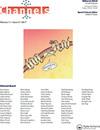Ion channel expression and function in normal and osteoarthritic human synovial fluid progenitor cells
IF 3.2
3区 生物学
Q2 BIOCHEMISTRY & MOLECULAR BIOLOGY
引用次数: 16
Abstract
ABSTRACT Osteoarthritis (OA) is a chronic disease affecting the cartilage of over 15% of Canadians. Synovial fluid mesenchymal progenitor cells (sfMPCs) are present in joints and are thought to contribute to healing. OA sfMPCs have a greater proliferative ability but decreased chondrogenic potential. However, little is known about the factors influencing/regulating the differences between normal and OA sfMPCs. Recently, our lab has shown that sfMPC chondrogenic differentiation in vitro is favorably biased toward a similar osmotic environment as they experience in vivo. The current study now examines the expression and functionality of a variety of ion channels in sfMPCs derived from normal individuals and early OA patients. Results indicated that there is differential ion channel regulation at the functional level and expression level in early OA sfMPCs. All ion channels were upregulated in early OA compared to normal sfMPCs with the exception of KCNMA1 at the mRNA level. At the protein level, TRPV4 was over expressed in early OA sfMPCs, while KCNJ12 and KCNMA1 were unchanged between normal and early OA sfMPCs. At the functional level, the inward rectifying potassium channel was under expressed in early OA sfMPCs, however the membrane potential was unchanged between normal and early OA sfMPCs. In the synovial environment itself, a number of differences in ion concentration between normal and early OA synovial fluid were observed. These findings suggest that normal and OA progenitor cells demonstrate functional differences in how they interact with the synovial ion environment.正常和骨关节炎人滑液祖细胞中离子通道的表达和功能
骨关节炎(OA)是一种影响超过15%加拿大人软骨的慢性疾病。滑液间充质祖细胞(sfMPCs)存在于关节中,被认为有助于关节愈合。OA sfMPCs具有更强的增殖能力,但软骨形成潜力降低。然而,影响/调节正常和OA sfMPCs差异的因素知之甚少。最近,我们的实验室已经表明,sfMPC在体外的软骨分化倾向于与体内相似的渗透环境。目前的研究正在检查来自正常人和早期OA患者的sfMPCs中各种离子通道的表达和功能。结果表明,早期OA sfMPCs在功能水平和表达水平上存在不同的离子通道调节。与正常sfMPCs相比,早期OA中除KCNMA1 mRNA水平外,所有离子通道均上调。在蛋白水平上,TRPV4在早期OA sfMPCs中过表达,而KCNJ12和KCNMA1在正常和早期OA sfMPCs中没有变化。在功能水平上,向内纠偏钾通道在早期OA sfMPCs中表达不足,但膜电位在正常和早期OA sfMPCs之间没有变化。在滑膜环境本身中,观察到正常和早期OA滑膜液中离子浓度的许多差异。这些发现表明,正常和OA祖细胞在如何与滑膜离子环境相互作用方面表现出功能差异。
本文章由计算机程序翻译,如有差异,请以英文原文为准。
求助全文
约1分钟内获得全文
求助全文
来源期刊

Channels
生物-生化与分子生物学
CiteScore
5.90
自引率
0.00%
发文量
21
审稿时长
6-12 weeks
期刊介绍:
Channels is an open access journal for all aspects of ion channel research. The journal publishes high quality papers that shed new light on ion channel and ion transporter/exchanger function, structure, biophysics, pharmacology, and regulation in health and disease.
Channels welcomes interdisciplinary approaches that address ion channel physiology in areas such as neuroscience, cardiovascular sciences, cancer research, endocrinology, and gastroenterology. Our aim is to foster communication among the ion channel and transporter communities and facilitate the advancement of the field.
 求助内容:
求助内容: 应助结果提醒方式:
应助结果提醒方式:


